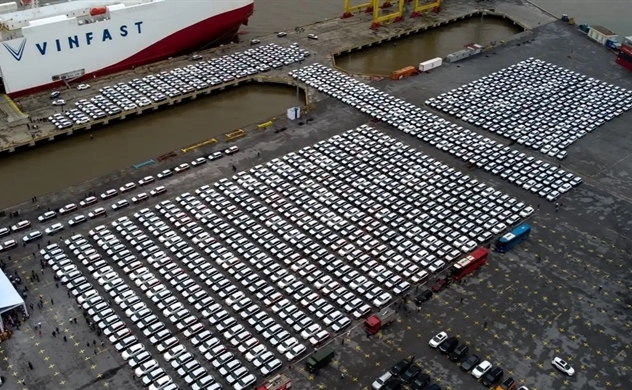Vietnam readies another sales tax cut to prop up flagging economy

Vinfast cars at a port in Haiphong city, Vietnam, to be shipped to the U.S. A decline in exports has hurt the country's economy. Photo by Reuters.
Le Minh Khai, the deputy prime minister in charge of the economy, this month signed off on a proposal to decrease the VAT rate. The Finance Ministry, which crafted the proposal, is finalizing the authorization of the tax plan.
The proposal calls for lowering the VAT to 8% from 10% until the end of the year. The cuts would translate to 5.8 trillion dong ($247 million) in lost tax revenue each month.
One shopper at the Vincom Center shopping mall in Hanoi expressed excitement.
"It'll be easier to buy clothes at Uniqlo," said the person.
The government lowered the VAT last year in response to the pandemic, but the cuts were not applicable to the telecommunications and real estate. The upcoming cut will include all goods and services.
Although the business community had called for an extension of last year's VAT cut, the government ended it on Dec. 31 as scheduled. Now Hanoi is being forced to make an about-face in just four months due to an unexpected economic slowdown.
Gross domestic product expanded just 3.32% in the first quarter from a year earlier, sharply down from last year's robust numbers, as the slump in global semiconductor demand spilled over to electronics exports.
Samsung Electronics has concentrated manufacturing capacity in Vietnam's northern Bac Ninh province. The GDP in Bac Ninh plunged 11.85% in the first quarter, marking the biggest decline among all 63 provinces and municipalities.
The Asian Development Bank forecasts Vietnam's economic growth at 6.5% this year, but the current slowdown may not be fully factored into that forecast.
A viral TikTok video posted this month depicted the painful effect of a mass layoff on a rural community, showing what looked like shuttered workshop doors and deserted streets.
According to Vietnam's official statistics, 149,000 lost their jobs in the first quarter, up 30,000 people from the previous quarter. The labor market has especially soured for textiles, consumer electronics, footwear and other sectors reliant on outside demand.
It was reported in February that Taiwan's Pou Chen Group, which makes shoes for brands like Nike and Adidas, is planning to cut thousands of jobs in Vietnam.
Meanwhile, Vietnamese consumers have tightened their purse strings. New vehicle sales volume dropped 19% on the year in March, according to an industry group. Monthly retail sales reported by the government is still showing double-digit growth, but "I don't feel that it's as good as the statistics say," said a retailer.
Vietnam's economy is considered a leading economic indicator for the rest of Southeast Asia. Emerging economies outside of China are expected to grow 4.6% this year, according to the Asian Development Bank, which is below the 5.4% recorded last year. On top of weak exports, concerns about inflation remain strong.
Source: Nikkei Asia

 TIẾNG VIỆT
TIẾNG VIỆT 




_14157616.jpg)












